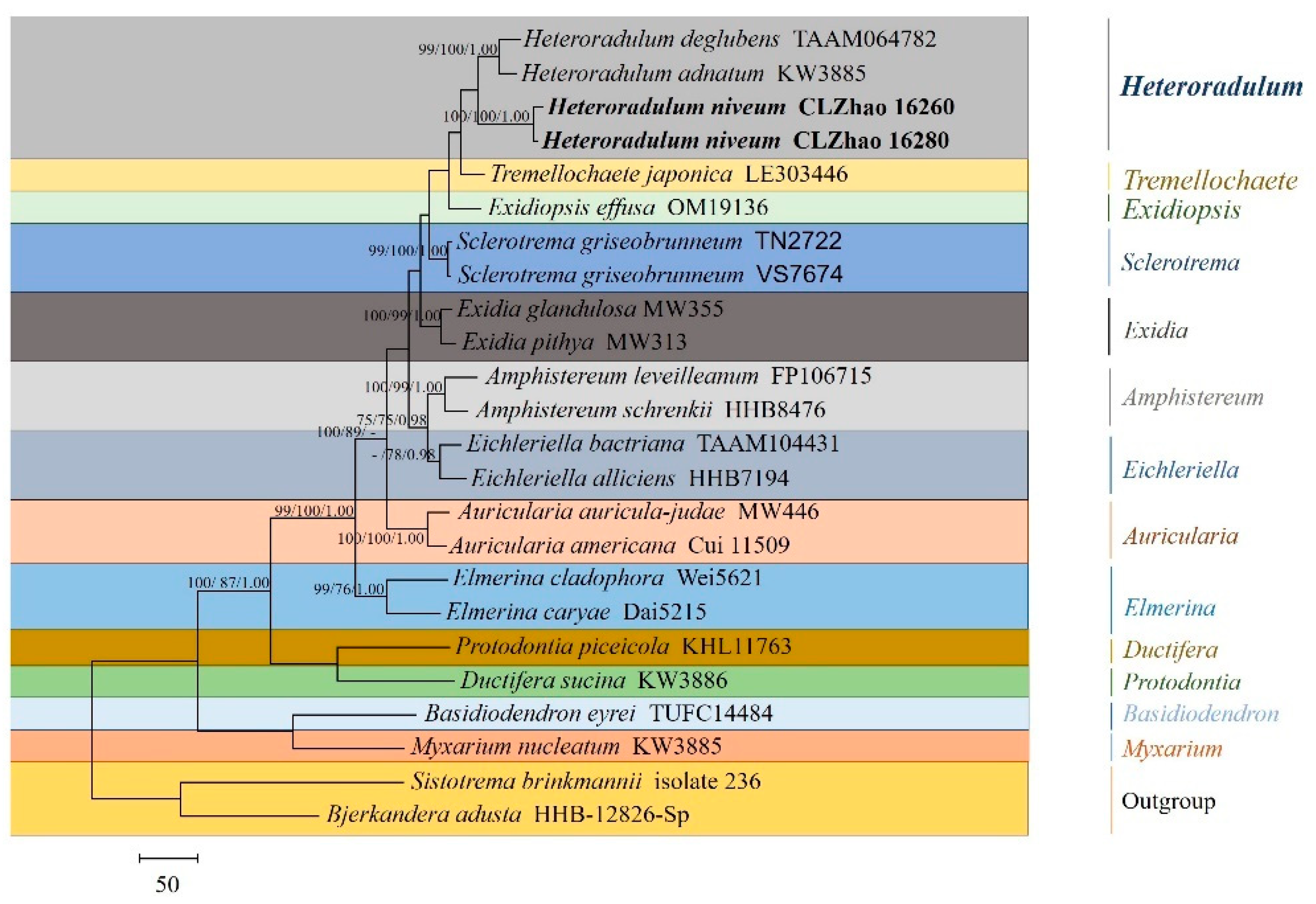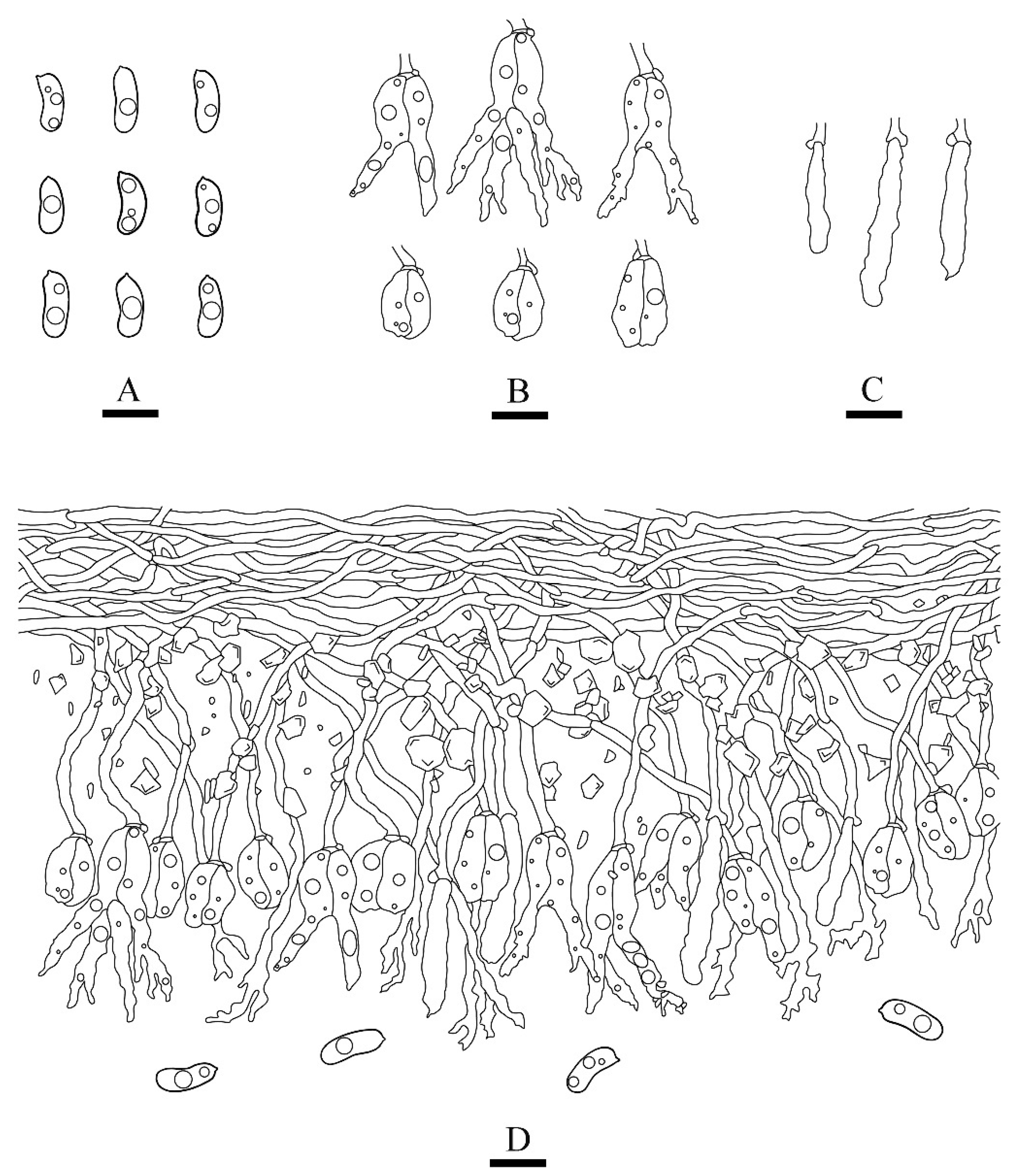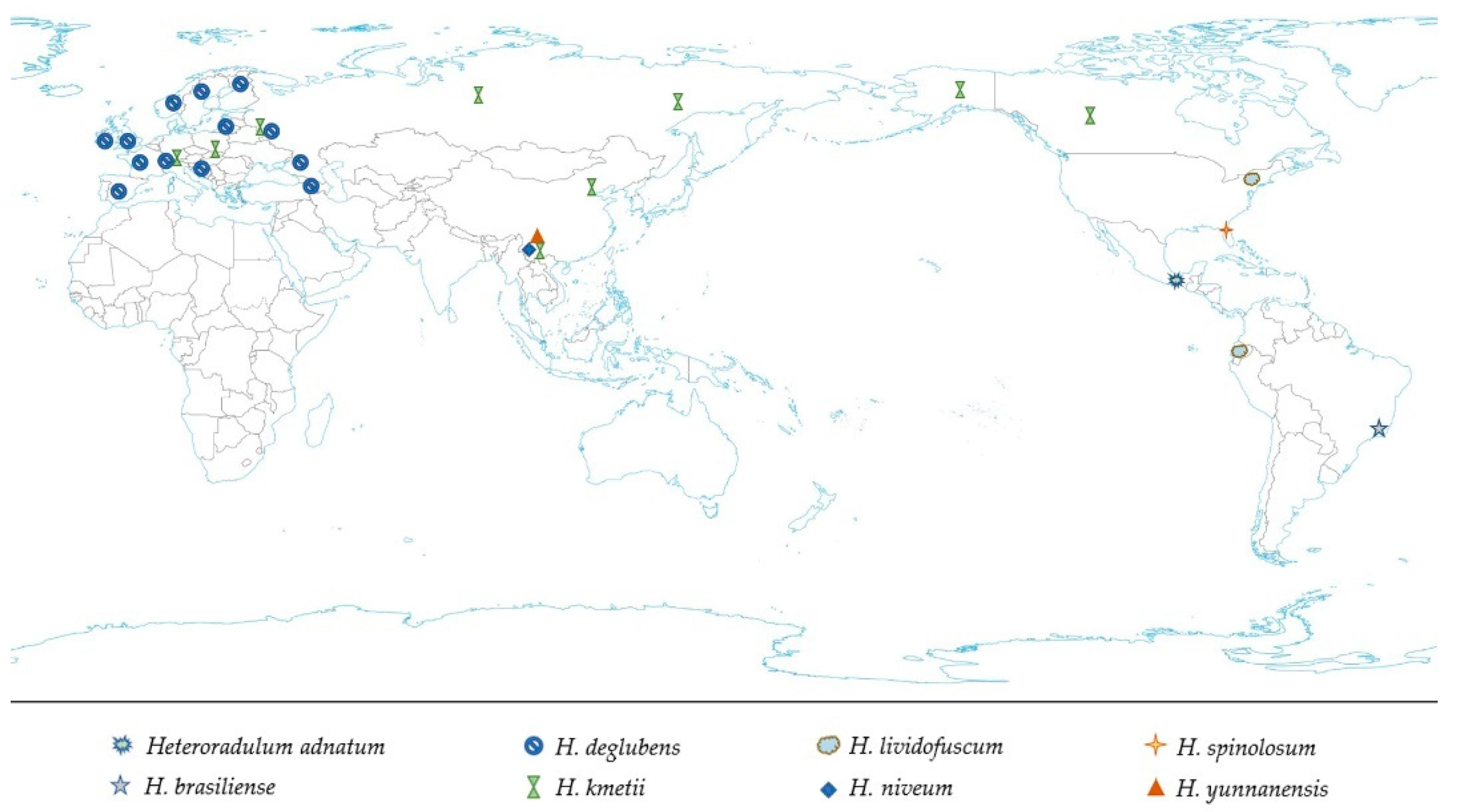The Morphological Characteristics and Phylogenetic Analyses Revealed an Additional Taxon in Heteroradulum (Auriculariales)
Abstract
:1. Introduction
2. Materials and Methods
2.1. Morphological Studies
2.2. Molecular Methods
3. Results
3.1. Molecular Phylogeny
3.2. Taxonomy
4. Discussion
Author Contributions
Funding
Institutional Review Board Statement
Informed Consent Statement
Data Availability Statement
Conflicts of Interest
References
- Bandoni, R. The tremellales and auriculariales: An alternative classification. Trans. Mycol. Soc. Jpn. 1984, 25, 489–530. [Google Scholar]
- Hibbett, D.S.; Bauer, R.; Binder, M.; Giachini, A.J.; Hosaka, K.; Justo, A.; Larsson, E.; Larsson, K.H.; Lawrey, J.D.; Miettinen, O.; et al. Systematics and Evolution (14) Agaricomycetes; Springer: Berlin/Heidelberg, Germany, 2014; pp. 373–429. [Google Scholar] [CrossRef]
- Spirin, V.; Malysheva, V.; Roberts, P.; Trichies, G.; Larsson, K.H. A convolute diversity of the Auriculariales (Agaricomycetes, Basidiomycota) with sphaeropedunculate basidia. Nord. J. Bot. 2019, 37, e02394. [Google Scholar] [CrossRef]
- Malysheva, V.; Spirin, V. Taxonomy and phylogeny of the Auriculariales (Agaricomycetes, Basidiomycota) with stereoid basidiocarps. Fungal Biol. 2017, 8, 689–715. [Google Scholar] [CrossRef] [Green Version]
- Alvarenga, R.L.M.; Gibertoni, T.B. Crystallodon alvarenga gen. nov., a new genus of the Auriculariales from the Neotropics. Cryptogam. Mycol. 2021, 42, 17–24. [Google Scholar] [CrossRef]
- Berkeley, M.J. Notices of North American fungi. Grevillea 1873, 1, 145–150. [Google Scholar] [CrossRef]
- Berkeley, M.J.; Broome, C.E. Notices of British fungi (1402–1500). Annu. Mag. Nat. Hist. Ser. 1875, 15, 28–41. [Google Scholar] [CrossRef]
- Patouillard, N.T.; Lagerheim, G.de. Champignons de l’Equateur (Pugillus III). Bull. De La Société Mycol. De Fr. 1893, 9, 124–165. [Google Scholar]
- Bresadola, G. Hymenomycetes Hungarici Kmetiani. Atti Dell´Ist. R. Dell´Accad. Di Rovereto Di Sci. 1897, 3, 66–120. [Google Scholar]
- Bodman, M.C. A taxonomic studey of the genus Heterochaete. Lloydia 1953, 15, 193–233. [Google Scholar]
- Guan, Q.X.; Liu, C.M.; Zhao, T.J.; Zhao, C.L. Heteroradulum yunnanensis sp. nov. (Auriculariales, Basidiomycota) evidenced by morphological characters and phylogenetic analyses in china. Phytotaxa 2020, 437, 51–59. [Google Scholar] [CrossRef] [Green Version]
- Möller, A. Protobasidiomyceten. Bot. Mitth. Aus Den Trop. 1895, 8, 1–180. [Google Scholar]
- Martín, M.P.; Zhang, L.F.; Fernández-López, J.; Dueñas, M.; Rodríguez-Armas, J.L.; Beltrán-Tejera, E.; Telleria, M.T. Heteroradulum paramacaronesicum sp. nov. (Meruliaceae, Polyporales, Basidiomycota), a cryptic lineage to H. macaronesicum. Fungal Syst. Evol. 2018, 2, 57–68. [Google Scholar] [CrossRef] [PubMed]
- Raitviir, A. Some new species and a new genus of Discomycetes and Heterobasidiomycetidae. Eest. NSV Tead. Akad. Toim. 1964, 13, 28–32. [Google Scholar]
- Yuan, H.S.; Lu, X.; Decock, C. Molecular and morphological evidence reveal a new genus and species in Auriculariales from tropical China. MycoKeys 2018, 35, 27. [Google Scholar] [CrossRef] [Green Version]
- Petersen, J.H. Farvekort. The Danish Mycological Society’s Colour-Chart; Foreningen til Svampekundskabens Fremme: Greve, Denmark, 1996; pp. 1–6. [Google Scholar]
- Dai, Y.C. Polypore diversity in China with an annotated checklist of Chinese polypores. Mycoscience 2012, 53, 49–80. [Google Scholar] [CrossRef]
- Zhao, C.L.; Wu, Z.Q. Ceriporiopsis kunmingensis sp. nov. (Polyporales, Basidiomycota) evidenced by morphological characters and phylogenetic analysis. Mycol. Prog. 2017, 16, 93–100. [Google Scholar] [CrossRef]
- White, T.J.; Bruns, T.; Lee, S.; Taylor, J. Amplification and direct sequencing of fungal ribosomal RNA genes for phylogenetics. PCR Protoc. A Guide Methods Appl. 1990, 18, 315–322. [Google Scholar] [CrossRef]
- Wu, F.; Yuan, Y.; He, S.H.; Bandara, A.R.; Hyde, K.D.; Malysheva, V.F.; Li, D.W.; Dai, Y.C. Global diversity and taxonomy of the Auricularia auricula-judae complex (Auriculariales, Basidiomycota). Mycol. Prog. 2015, 14, 95. [Google Scholar] [CrossRef]
- Floudas, D.; Hibbett, D.S. Revisiting the taxonomy of Phanerochaete (Polyporales, Basidiomycota) using a four gene dataset and extensive ITS sampling. Fungal Biol. 2015, 119, 679–719. [Google Scholar] [CrossRef]
- Wells, K.; Bandoni, R.J.; Lim, S.R.; Berbee, M.L. Observations on some species of Myxarium and reconsideration of the Auriculariaceae and Hyaloriaceae (Auriculariales). In Frontiers in Basidiomycote Mycology; Agerer, R., Piepenbring, M., Blanz, P., Eds.; IHW-Verlag: Eching, Germany, 2004; pp. 237–248. [Google Scholar]
- Zhou, L.W.; Dai, Y.C. Phylogeny and taxonomy of poroid and lamellate genera in the Auriculariales (Basidiomycota). Mycologia 2013, 105, 1219–1230. [Google Scholar] [CrossRef] [PubMed]
- Wei, M.; Oberwinkler, F. Phylogenetic relationships in Auriculariales and related groups–hypotheses derived from nuclear ribosomal DNA sequences. Mycol. Res. 2001, 105, 403–415. [Google Scholar] [CrossRef]
- Hall, T.A. Bioedit A user-friendly biological sequence alignment editor and analysis program for windows 95/98/NT. Nucleic Acids Symp. Ser. 1999, 41, 95–98. [Google Scholar]
- Justo, A.; Miettinen, O.; Floudas, D.; Ortiz-Santana, B.; Sjökvist, E.; Lindner, D.; Nakasone, K.; Niemelä, T.; Larsson, K.H.; Ryvarden, L.; et al. A revised family-level classification of the Polyporales (Basidiomycota). Fungal Biol. 2017, 121, 798–824. [Google Scholar] [CrossRef]
- Swofford, D.L. PAUP*: Phylogenetic Analysis Using Parsimony (*and Other Methods); Version 4.0b10; Sinauer Associates: Sunderland, MA, USA, 2002; pp. 1–18. [Google Scholar]
- Felsenstein, J. Confidence intervals on phylogenetics an approach using bootstrap. Evolution 1985, 39, 783–791. [Google Scholar] [CrossRef]
- Miller, M.A.; Pfeiffer, W.; Schwartz, T. The CIPRES Science Gateway: Enabling High-Impact Science for Phylogenetics Researchers with Limited Resources. Assoc. Comput. Mach. 2012, 39, 1–8. [Google Scholar] [CrossRef]
- Nylander, J.A.A. MrModeltest v2. Program Distributed by the Author; Evolutionary Biology Centre, Uppsala University: Uppsala, Sweden, 2004. [Google Scholar]
- Ronquist, F.; Huelsenbeck, J.P. MrBayes 3: Bayesian phylogenetic inference under mixed models. Bioinformatics 2003, 19, 1572–1574. [Google Scholar] [CrossRef] [PubMed] [Green Version]
- Bernicchia, A.; Gorjón, S.P. Fungi Europaei Corticiaceae; s.l. Edizioni Candusso: Lomazzo, Italy, 2010; Volume 12, pp. 1–1007. [Google Scholar]
- Miettinen, O.; Larsson, E.; Sjökvist, E.; Larsson, K.H. Comprehensive taxon sampling reveals unaccounted diversity and morphological plasticity in a group of dimitic polypores (Polyporales, Basidiomycota). Cladistics 2012, 28, 251–270. [Google Scholar] [CrossRef] [Green Version]
- Dai, Y.C.; Cui, B.K.; Si, J.; He, S.H.; Hyde, K.D.; Yuan, H.S.; Liu, X.Y.; Zhou, L.W. Dynamics of the worldwide number of fungi with emphasis on fungal diversity in China. Mycol. Prog. 2015, 14, 62. [Google Scholar] [CrossRef]
- Gu, Z.R.; Zhao, C.L. The hidden wood-decaying fungal diversity: Rhizochaete from east Asia. Diversity 2021, 3, 503. [Google Scholar] [CrossRef]
- Luo, K.Y.; Qu, M.H.; Zhao, C.L. Additions to the knowledge of corticioid Xylodon (Schizoporaceae, Hymenochaetales): In-troducing three new Xylodon species from southern China. Diversity 2021, 13, 581. [Google Scholar] [CrossRef]
- Boonyuen, N.; Chuaseeharonnachai, C.; Nuankaew, S.; Kwantong, P.; Pornputtapong, N.; Suwannarach, N.; Jones, E.B.G.; Somrithipol, S. Novelties in Fuscosporellaceae (Fuscosporellales): Two new Parafuscosporella from Thailand revealed by morphology and phylogenetic analyses. Diversity 2021, 13, 517. [Google Scholar] [CrossRef]
- Monkai, J.; Tibpromma, S.; Manowong, A.; Mapook, A.; Norphanphoun, C.; Hyde, K.D.; Promputtha, I. Discovery of three novel Cytospora species in Thailand and their antagonistic potential. Diversity 2021, 13, 488. [Google Scholar] [CrossRef]





| Species Name | Sample No. | GenBank Accession No. | References | Country | |
|---|---|---|---|---|---|
| ITS | nLSU | ||||
| Amphistereum leveilleanum | FP 106715 | KX262119 | [4] | Russia | |
| KX262168 | [4] | USA | |||
| A. schrenkii | HHB 8476 | KX262130 | KX262178 | [4] | USA |
| Auricularia americana | Cui 11509 | KT152094 | KT152110 | [20] | China |
| A. auricula-judae | MW 446 | AF291268 | AF291289 | [20] | Germany |
| Basidiodendron eyrei | TUFC 14484 | AB871753 | AB871734 | [4] | Japan |
| Bjerkandera adusta | HHB-12826-Sp | KP134983 | KP135198 | [21] | North America |
| Ductifera sucina | KW 3886 | AY509551 | AY509551 | [22] | New Zealand |
| Eichleriella alliciens | HHB 7194 | KX262120 | KX262169 | [4] | USA |
| E. bactriana | TAAM 104431 | KY262138 | KY262186 | [4] | Germany |
| Elmerina caryae | Dai 5215 | JQ764654 | JQ764633 | [23] | Italy |
| E. cladophora | Wei 5621 | JQ764659 | JQ764634 | [23] | China |
| Exidia glandulosa | MW 355 | AF291273 | AF291319 | [24] | Germany |
| E. pithya | MW 313 | AF291275 | AF291321 | [24] | Germany |
| Exidiopsis effusa | OM 19136 | KX262145 | KX262193 | [4] | Finland |
| Heteroradulum adnatum | LR 23453 | KX262116 | KX262165 | [4] | Mexico |
| H. deglubens | TAAM 064782 | KX262101 | KX262148 | [4] | Russia |
| H. niveum | CLZhao 11204 | MZ352947 | MZ352932 | this study | China |
| H. niveum | CLZhao 11210 | MZ352948 | MZ352933 | this study | China |
| H. niveum | CLZhao 16260 | MZ352940 | MZ352934 | this study | China |
| H. niveum | CLZhao 16280 | MZ352941 | MZ352935 | this study | China |
| H. niveum | CLZhao 16398 | MZ352942 | MZ352936 | this study | China |
| H. niveum | CLZhao 16424 | MZ352943 | MZ352937 | this study | China |
| H. niveum | CLZhao 16432 | MZ352944 | this study | China | |
| H. niveum | CLZhao 16472 | MZ352945 | MZ352938 | this study | China |
| H. niveum | CLZhao 16483 | MZ352946 | MZ352939 | this study | China |
| H. yunnanensis | CLZhao 4023 | MT215564 | MT215568 | [11] | China |
| H. yunnanensis | CLZhao 8106 | MT215565 | MT215569 | [11] | China |
| H. yunnanensis | CLZhao 9132 | MT215566 | MT215570 | [11] | China |
| H. yunnanensis | CLZhao 9200 | MT215567 | MT215571 | [11] | China |
| Sclerotrema griseobrunneum | VS 7674 | KX262140 | KX262188 | [4] | Russia |
| Sistotrema brinkmannii | Isolate 236 | JX535169 | JX535170 | [4] | Russia |
| Tremellochaete japonica | LE 303446 | KX262110 | KX262160 | [4] | Russia |
Publisher’s Note: MDPI stays neutral with regard to jurisdictional claims in published maps and institutional affiliations. |
© 2022 by the authors. Licensee MDPI, Basel, Switzerland. This article is an open access article distributed under the terms and conditions of the Creative Commons Attribution (CC BY) license (https://creativecommons.org/licenses/by/4.0/).
Share and Cite
Li, J.-J.; Zhao, C.-L.; Liu, C.-M. The Morphological Characteristics and Phylogenetic Analyses Revealed an Additional Taxon in Heteroradulum (Auriculariales). Diversity 2022, 14, 40. https://doi.org/10.3390/d14010040
Li J-J, Zhao C-L, Liu C-M. The Morphological Characteristics and Phylogenetic Analyses Revealed an Additional Taxon in Heteroradulum (Auriculariales). Diversity. 2022; 14(1):40. https://doi.org/10.3390/d14010040
Chicago/Turabian StyleLi, Jia-Jin, Chang-Lin Zhao, and Chao-Mao Liu. 2022. "The Morphological Characteristics and Phylogenetic Analyses Revealed an Additional Taxon in Heteroradulum (Auriculariales)" Diversity 14, no. 1: 40. https://doi.org/10.3390/d14010040
APA StyleLi, J.-J., Zhao, C.-L., & Liu, C.-M. (2022). The Morphological Characteristics and Phylogenetic Analyses Revealed an Additional Taxon in Heteroradulum (Auriculariales). Diversity, 14(1), 40. https://doi.org/10.3390/d14010040







